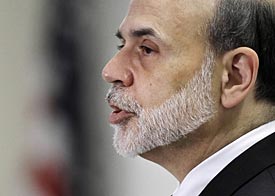Federal Reserve Chairman Ben S. Bernanke on Friday laid out a case for the central bank to take further action to bolster growth, citing the risks of prolonged high unemployment and a U.S. economy slipping into a deflationary spiral.
In a much-anticipated speech in Boston, Bernanke did not spell out details of how and when the Fed would take action. But the first option that he mentioned was a program of buying additional assets, namely government bonds, in an effort to drive down long-term interest rates and stimulate economic growth.
The central bank is widely expected to announce such a program, known as quantitative easing, at its next policymakers’ meeting on Nov. 2 and 3.
“There would appear to be a case for further action,” he said at a conference sponsored by the Federal Reserve Bank of Boston.
As Bernanke spoke, the government released statistics showing the so-called core inflation rate, which excludes volatile energy and food prices, was unchanged in September and now running at an annual rate of 0.8% — well below the Fed’s informal desired target of 1.5% to 2%. Separately, there was better-than-expected news on last month’s retail sales activity as total sales rose 0.6% from the prior month, boosted by higher auto sales.
Bernanke said in his speech that the “preconditions for a pickup in growth next year remain in place,” indicating improvements in household finances, solid business investments and a recovery in state and local tax revenues. But the Fed chief also pointed to the troubled housing market and the slow rate of private-sector job growth, which dampens consumer spending and poses risks for the sustainable growth of the whole economy. And while economic growth is expected to be stronger next year, he said, it isn’t likely to expand fast enough to bring down the unemployment rate quickly.
Diane Swonk, chief economist at Mesirow Financial in Chicago, said Bernanke’s remarks make it clear that quantitative easing by the Fed is “a done deal.” But in a note, she said, “the magnitude of what the Fed is willing to buy, in terms of large-scale asset purchases, is still an issue for debate. Our bet is that the Fed could eventually expand its balance sheet by an additional trillion [dollars].”
Analysts are divided on the potential impact of a large-scale Fed purchase of government Treasury bonds to the real economy, given that long-term interest rates are already at historical lows. And in injecting hundreds of billions of dollars into the financial system, there is a threat of higher long-term inflation that could undermine the central bank’s credibility.
Still, with little chance of new major fiscal stimulus coming to support the economy, and the Fed at the moment falling short on both of its objectives — maximizing employment and maintaining price stability — analysts say Bernanke and his colleagues have to do something.






You Pay, They Play. End the Fed.
The Fed is unconstitutional, and should be abolished.
Period.
The more they interfere, the worse things become.
I think Fed should look into revaluating dollar. So far by lowering the value of dollar has not produced desired result. The argument is that it will be cheaper to sell US products, but we find the trade deficit has been growing and keeps on growing. Let us look into a scenario that we double the value of dollar. The trade deficit will be half. It is true that foreign goods will become even cheaper, but many items that cost more will also become cheaper like cars, TV etc. At that point the Fed can look into pricing policy of foreign companies.
See UK currency is still much more valued that US dollar and they are surviving better than us.
Second thing Fed should do to put some sanction for imports to countries like China who purposely devalue their currency.
Another part is for us, that we need to change our attitude. We need to buy American goods instead of foreign goods and give importance to quality. That will work both ways. Instead of buying cheap Chinese goods which do not have good quality we need to start looking into good quality American goods.
The point to NOT doubling the value of the dollar is that banks will still ask for the same number of dollars to the debts they all hold. This includes my mortgager and the Chinese. All of a sudden, with half the dollars available we now still have to pay for all our debts. In short, it won’t work. Remember, this is debt recession. What we want to pay those debts is inflation.